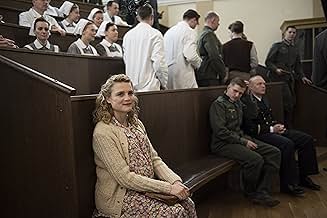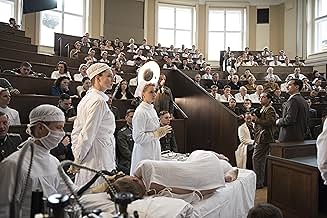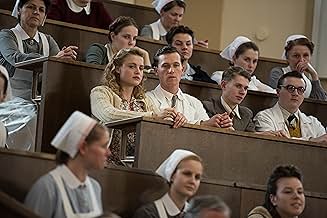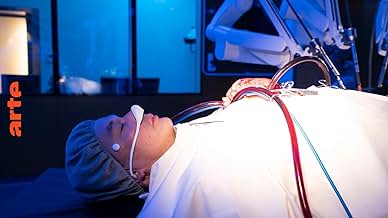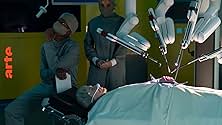Un hospital alemán en 1943 tiene que lidiar con los efectos de la segunda guerra mundial y las crueles políticas del régimen Nazi.Un hospital alemán en 1943 tiene que lidiar con los efectos de la segunda guerra mundial y las crueles políticas del régimen Nazi.Un hospital alemán en 1943 tiene que lidiar con los efectos de la segunda guerra mundial y las crueles políticas del régimen Nazi.
- Premios
- 3 premios ganados y 9 nominaciones en total
Explorar episodios
Opiniones destacadas
Very well made and great character studies. There were some inaccuracies such as the setting started out in the Autumn of 1943 and and there is a discussion about heading to Africa to be with Rommel. The North African campaign was lost by the Germans and over by the Spring of that year.
Many medical issues and procedures seem correct for its time, but the one doctor was doing mouth to mouth on a baby and that procedure did not come into practice until the 1950s. Perhaps that was to show the doctor was imaginative and non-conformist.
An event where the doctors were treating a hemo-pneumo thorax showed the doctors first interested in removing the metal in the chest, when in fact the priority is on relieving intrathoracic pressure via a chest tube or needle decompression and then stopping bleeding and then vascular and tissue repair. Getting the bullet out is something Hollywood has been hung up on from the beginning. The doctor though, does explain why he wants to look for the metal and remove it, perhaps to appease those that would question it, but the priority was off.
Anyway, the show is a must for those interested in history and/or medical shows.
Moving, thoughtful and thought provoking. While these events were unfolding in Berlin I was in London and, briefly, a patient in the blacked out and lightly blitzed Children's Hospital, Great Ormand St. Only people of my advanced age , British as well as German, will fully understand what they are seeing. However all the youngsters can enjoy the intelligent script and fine acting.
Overall, good television. There are a few points that an American audience may find cloying, but I had no problem with it. It may be too "soapy" with the romantic entanglements woven into the story. I could have done without the melodrama-- less of it anyway-- but it has to be taken into consideration this is a "continental European" drama. In many ways, this can be attributed to the timeframe of the story. Late nineteenth century European society was more heavily church dominated in that era. So, what seems like quaint, outdated and even eyerolling concerns that weigh so heavily in this story can come off as silly, in that period these were issues that strongly impacted daily life. While these subplots may seem overly dusty to most viewers, it certainly is historically appropriate. There is also the fact that this was produced with a German audience first and foremost. As I've seen in other recent German productions (Babylon Berlin; Our Fathers, Our Mothers --aka "Generation War" outside of Germany) , the romantic subplots aren't presented in quite the same fashion as they are on this side of the Atlantic. As for myself, I find it a refreshing shift in presentation.
Production, writing and performance are all high standard. Well above what is typical German television. While it might not grab a huge audience in the U.S. because of its subtle but still distinctly different style in telling a story, I strongly encourage folks to give it a try.
Production, writing and performance are all high standard. Well above what is typical German television. While it might not grab a huge audience in the U.S. because of its subtle but still distinctly different style in telling a story, I strongly encourage folks to give it a try.
The thing I found most fascinating about this series is the way normal people survive under fascist rule. The duality of being healers and having to follow the terrible laws of the Nazi regime come very much into play.
The production quality is superb. It is provocative and we'll worth watching.
"Charite at War" covers the German hospital during World War II.
The film focuses on Anni (Mala Emde), her doctor husband Arthur (Artjom Gilz), the brilliant surgeon Sauerbruch, and Anni's brother (Otto Jannik Schumann), an in-the-closet gay. Given Rule 175, homosexuals who were caught were arrested and worse.
The group at the hospital reflects the differing views of citizens under Hitler's restrictions, some of whom display delusional thinking. Artur works with disabled children who are wards of the state as he works to develop a new vaccine. These children are eventually sent to another hospital, where Artur believes the children receive treatment, though the truth is, they are exterminated.
Sauerbruch goes along with Hitler's restrictions, but he believes he has a duty to all patients, and that includes Jews. He himself spoke to the Minister of Justice to end the extermination of children - and believes it is no longer happening.
Anni is a would-be doctor studying with Sauerbruch. Anni is comfortable that she and Artur have the correct genes. However, their new baby, Karin, possibly has hydrocephalus. This means she has to be reported and transferred, and that they may be sterilized. Instead, they treat the baby at home and then appeal to Sauerbruch for help. She and Artur face a crisis in their beliefs and in their marriage.
Otto falls in love with a male attendant at the hospital. There is a young nurse after him, who presses him for a commitment before he leaves for the service. When she doesn't get it, trouble ensues.
A cruel doctor accuses soldiers in the infirmary of faking their illness or wounded themselves, and they are sent for execution.
Meanwhile Germany is losing the war, and everyone hopes it will be over soon. Nobody seems to like Hitler. Sauerbruch thinks he's crazy. But they all live with terror.
Toward the end of the film, we see what Hitler sent out to fight - teenage boys. Pathetic.
An interesting cross-section of those who are secret spies and just plain keeping secrets as they try to get through their lives and survive Hitler.
"Charite at War" is depressing, and we see how the German people suffered. Toward the end of the war, there was no water, no supplies at the hospital, nothing, as doctors use liquor to sterilize their hands and anesthetize the patients.
And that's what happens when someone tells you that some people are superior to others, and anything that goes wrong with the country is the fault of these lesser people.
I'd say never forget, but it seems as though we have.
The film focuses on Anni (Mala Emde), her doctor husband Arthur (Artjom Gilz), the brilliant surgeon Sauerbruch, and Anni's brother (Otto Jannik Schumann), an in-the-closet gay. Given Rule 175, homosexuals who were caught were arrested and worse.
The group at the hospital reflects the differing views of citizens under Hitler's restrictions, some of whom display delusional thinking. Artur works with disabled children who are wards of the state as he works to develop a new vaccine. These children are eventually sent to another hospital, where Artur believes the children receive treatment, though the truth is, they are exterminated.
Sauerbruch goes along with Hitler's restrictions, but he believes he has a duty to all patients, and that includes Jews. He himself spoke to the Minister of Justice to end the extermination of children - and believes it is no longer happening.
Anni is a would-be doctor studying with Sauerbruch. Anni is comfortable that she and Artur have the correct genes. However, their new baby, Karin, possibly has hydrocephalus. This means she has to be reported and transferred, and that they may be sterilized. Instead, they treat the baby at home and then appeal to Sauerbruch for help. She and Artur face a crisis in their beliefs and in their marriage.
Otto falls in love with a male attendant at the hospital. There is a young nurse after him, who presses him for a commitment before he leaves for the service. When she doesn't get it, trouble ensues.
A cruel doctor accuses soldiers in the infirmary of faking their illness or wounded themselves, and they are sent for execution.
Meanwhile Germany is losing the war, and everyone hopes it will be over soon. Nobody seems to like Hitler. Sauerbruch thinks he's crazy. But they all live with terror.
Toward the end of the film, we see what Hitler sent out to fight - teenage boys. Pathetic.
An interesting cross-section of those who are secret spies and just plain keeping secrets as they try to get through their lives and survive Hitler.
"Charite at War" is depressing, and we see how the German people suffered. Toward the end of the war, there was no water, no supplies at the hospital, nothing, as doctors use liquor to sterilize their hands and anesthetize the patients.
And that's what happens when someone tells you that some people are superior to others, and anything that goes wrong with the country is the fault of these lesser people.
I'd say never forget, but it seems as though we have.
¿Sabías que…?
- TriviaSeason 3 takes place in Berlin, summer 1961.
- ConexionesReferenced in Riverboat - Die MDR-Talkshow aus Leipzig: Folge vom 15. Februar 2019 (2019)
Selecciones populares
Inicia sesión para calificar y agrega a la lista de videos para obtener recomendaciones personalizadas
- How many seasons does Charité have?Con tecnología de Alexa
Detalles
Contribuir a esta página
Sugiere una edición o agrega el contenido que falta


![Ver Trailer Staffel 2 [OV]](https://m.media-amazon.com/images/M/MV5BNWU0YWE0YjMtNDZjYy00ODk3LWE1NWItMjkwOTE0NTA5MDA4XkEyXkFqcGdeQXRyYW5zY29kZS13b3JrZmxvdw@@._V1_QL75_UX500_CR0)
